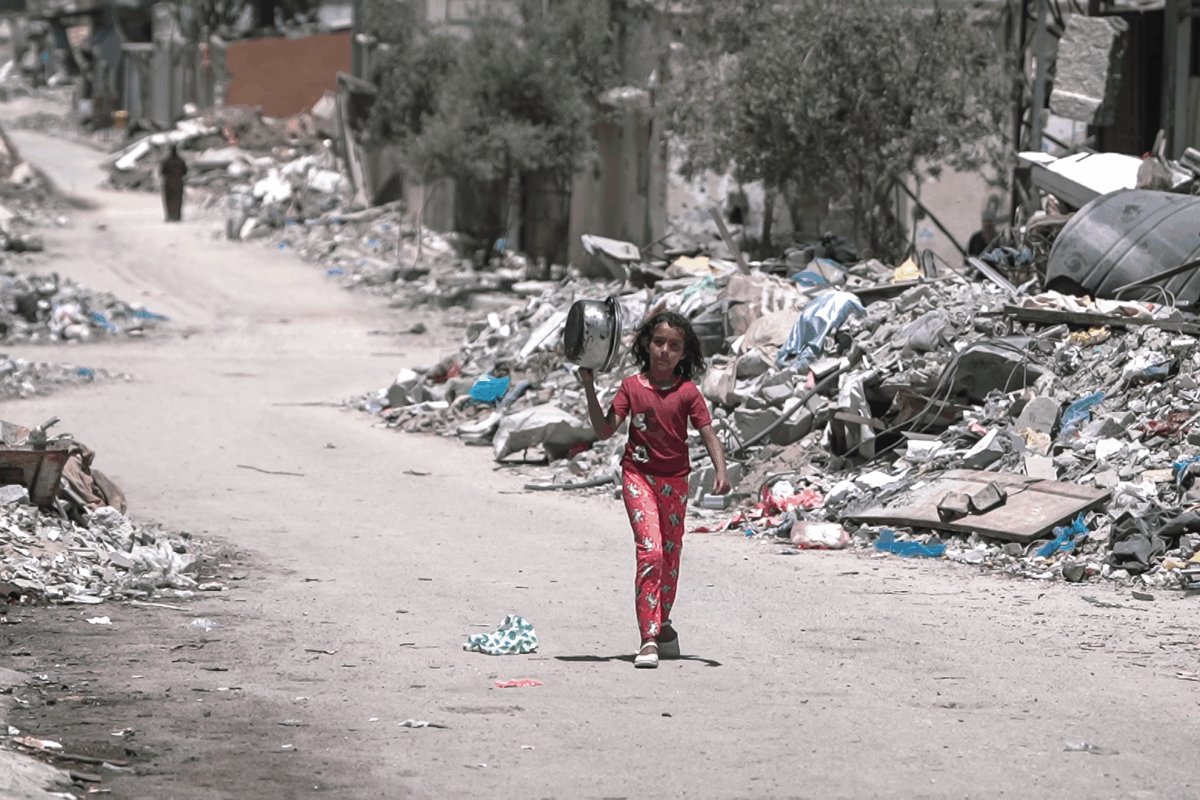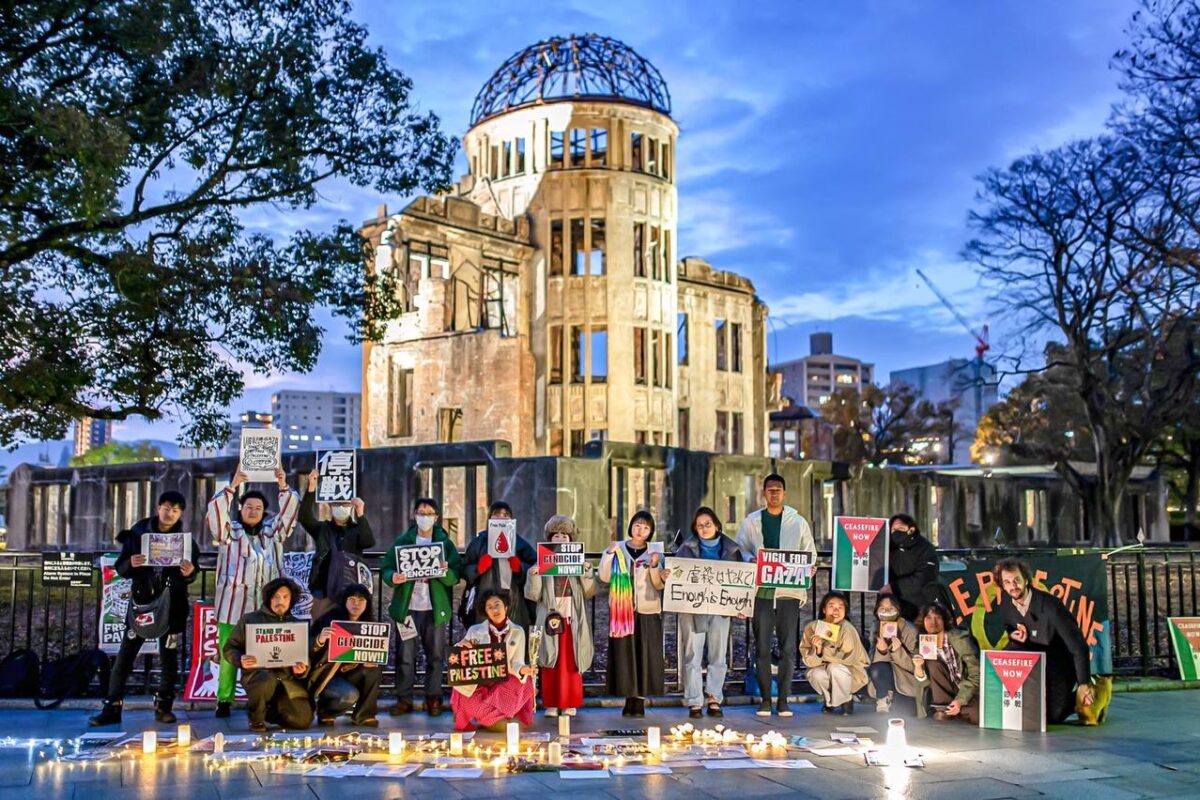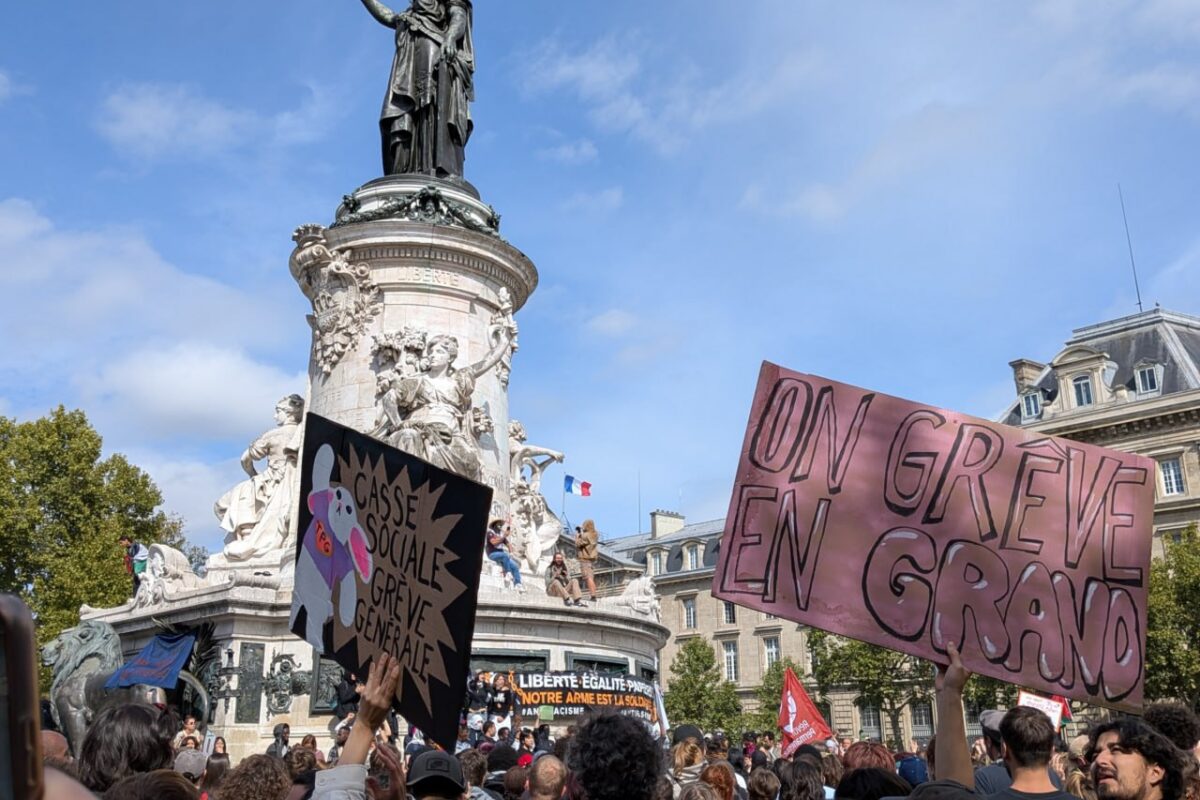You can read the English versions of this interview here and here.
広島では、平和は記念碑、資料館、学校のカリキュラムに息づいています。それは都市のアイデンティティに織り込まれ、災害から生まれた回復力、レジリエンス、道徳的な明確さの象徴として世界に向けて示されています。毎年夏になると、子どもたちは核兵器の恐ろしさを学び、被爆者の体験を聞き、平和はあらゆる代償を払ってでも守らなければならないと教えられます。
しかし現実には、ここでの平和はすでに達成されたものとして扱われがちです——記念とされ、儀式化され、他の場所で今起きている暴力から切り離されています。広島は原爆を忘れませんが、核問題以外についてはほとんど声を上げません。過去の出来事として保管され、現在起きていることは無視されています。
2023年10月、イスラエルがガザでのジェノサイドを開始した直後、アーティスト、学生、活動家たちが原爆ドームの前で祈りの追悼集会であるヴィジル(Vigil)を始めました。約30人からスタートした集会はほぼ毎日継続して行われ、抵抗の運動へと発展しました。キャンドルが灯され、ガザで殺された人々の名前が読み上げられ、チラシが通行人(海外からの観光客も含む)に手渡され、アートが披露されます。広島の平和物語におけるデフォルトの姿勢である「沈黙」は、意図的に破られています。
ドームの前でガザについて語るのは、多くの人々が、「このままでいい」と望むストーリーを中断することです。広島パレスチナともしび連帯共同体は、静かな反省を拒否し、代わりに問います。「平和」に固執するのに正義からは逃れるこの場所で、政治的なメッセージを発信し、公に悲しむことは何を意味するのでしょうか? 原爆の記憶が「見ないための口実」となる時、何が起こるのでしょうか?
この対話の第一部では、グループの3人のメンバー——ユダヤとフィリピンのルーツを持つ反シオニストのアーティスト、レベッカ・マリア・ゴールドシュミットと、 広島出身のアーティスト兼アパレル店員のセーラーかんな子、そして広島を拠点とするノイズミュージシャンのAnndoe——が、ヴィジルがどのように始まり、どのように受け止められてきたか、そして平和を再定義する必要性について語ります。つまり平和とは戦争が起きないことではなく、すでに世界中で繰り返されている残虐行為から目を背けないことには実現し得ないのです。
こんにちは、この祈りの集いがどのように始まったのか、少し背景を教えていただけますか?
レベッカ:集会は、2023年10月13日(金)に、10月7日以降の出来事に反応する形で始まりました。広島市立大学の教授である田浪亜央江さんと、同じ大学の大学院生である私を含む約30人(主に学生と反戦活動家)が、広島の平和公園にある原爆ドームに集まり、パレスチナ人とユダヤ人の命を偲び、75年以上の占領、イスラエルのアパルトヘイト、そして今も続くジェノサイドの終結を訴えました。もう一人の広島市立大学の教授である湯浅正恵さんと他の地域住民と共に、私たちは一週間毎日夜に集まり、講演者を招き、キャンドルを灯し、歌を歌い、情報を共有する活動を続けました。
私個人としては、それを「シット・イン・シヴァ」と捉えていました。シヴァとは、ユダヤ教の喪の期間で、地面に座りながら1週間を過ごし、人々が自宅を訪れて食事や弔意を捧げる習慣です。しかし1週間が過ぎても、私たちは毎晩ドームに戻り続け、その規模は次第に拡大していきました。私たちはドームの前で500日以上連続で立ち続け、その後、より緩やかなスケジュールに移行しました。一部のメンバーは週に3~4日立ち続けることもありました。現在、私たちは週に3日ほど、より大きなグループで集まり、平和公園を通る人々の意識にパレスチナを刻み込むため、声を上げ続けています。
この祈りの主なメッセージや目標は何ですか?言い換えれば、この集会が何を意味し、何を達成することを望んでいるのか。
セーラーかんな子:「平和」の象徴とされる原爆ドームで、戦争、ジェノサイド、植民地主義が過去のものではなく今も続いていることを世界に向けて訴えること。
Anndoe: FREE PALESTINE. FREE GAZA. STOP GENOCIDE RIGHT NOW. and FREE OURSELVES.
レベッカ:イスラエルのアパルトヘイトを終わらせろ!シオニズムを廃止せよ!イスラエルを廃止せよ!土地を返せ!そして国際的な連帯を永遠に!私たちの目標は、パレスチナとガザを忘れないようにし、私たちの果たすべき責任を広めることです。
もっと広く言えば、ヒロシマは何を象徴していると思いますか?
セーラーかんな子: 原爆ドームで私たちがスタンディングをしているとき、通行人の多くは私たちの姿が写り込まないように避けて、ドームの写真だけ撮影して去っていきます。毎日のように起こるこの場面が今の広島を象徴的に表しています。広島は「平和都市」と自称しているが、広島が原爆と戦争を語るとき、それはすでに過ぎ去ったものとして語られ、今起きているガザでのジェノサイドには目を向けられません。
例えば広島の子どもは小学校から高校まで、毎年夏には「平和学習」という、被爆者の声を聞き、原爆の被害について学ぶプログラムを受けて育ちます。そこで植え付けられるメッセージは「平和を“守る”ために、同じ苦しみを二度と繰り返さない」というものです。そこには、「平和とは何なのか?」「平和はもしかしたらまだ達成されていないのでは?」という疑念は一切ありません。
広島に限らず日本では、しばしば「平和を守ろう」という表現が使われます。平和とは、それを実現することを目指して一人一人が努力するようなものではなく、すでに私たちの生活の前提としてあるものとして考えられています。疑う余地もなく戦争はすでに終わっていると、子どもの頃から教え込まれているのです。だから、被爆者の苦しみとガザの人々の苦しみが重ならない。今の広島にとって「平和」とは何も考えないでいるための言い訳です。
ガザで起きていることについて、政府、メディア、一般市民を問わず、日本は十分なことをしていると思いますか?
セーラーかんな子: 全く十分ではありません。まず、政府はイスラエルに対して外交的または経済的な圧力をかけてジェノサイドを止めさせる行動を取るべきなのに、未だに経済的協力関係を結び、制裁も行わず、それどころか日本の防衛省はイスラエルから武器を購入する予定です。
基本的に日本の政策決定は常にアメリカの顔色を伺いながら決められており(唯一の被爆国なのに核兵器禁止条約に批准していないように)、これはパレスチナ・イスラエルに対しても同じです。最も酷かったのは、2024年にアメリカがUNRWAへの資金拠出を停止した時、その判断にただ追従する形で日本も拠出を停止したことです。10.7以前は長年にわって日本はパレスチナにおける人道支援に尽力してきたのに、あっさりとパレスチナの人々からの信頼を裏切ってしまった。日本がこれまで公費(私たちの税金)を使って設立し運営されてきた学校や病院がイスラエルの攻撃によっていくつも破壊されているが、これに対しての日本政府からイスラエルへの抗議は全くないようです。(出典:Gaza: Damage of Japan-backed facilities https://gaza.mapping.jp/index_en.html )
政府がアメリカ依存の意思決定をするのと同じように、メディアと市民も他者依存的な意思決定をするのをやめられないでいます。それはもうほとんど病気のようです。メディアについては、ほとんどの大手テレビ局・新聞社が自分の意見を書くということをしません。どの記事でも、どのニュース番組でも同じような言い回し(「パレスチナ自治区のガザを実効支配するイスラム原理主義組織のハマス」など)がコピー&ペーストで使われます。ジェノサイドを行なっているのは誰なのかという主語は明示されず、まるでガザの人々が事故的に亡くなっているかのような、はっきりとしない曖昧な表現が貫かれてきました。それは、間違いをおかしたり批判を受けたり、主流の価値観から逸脱することによって恥をかくことを極端に恐れるからです。
また、大手のメディアにおいて、イスラエルがパレスチナに対して長年行なってきた植民地支配について触れられることはほとんどなく、植民地主義の延長線上で今起きているジェノサイドを位置付けるような報道がされることは、ほぼありません。そのため、「“イスラム組織”のハマス」という単語だけが過剰に強調され、今ガザで起きていることがユダヤ教とイスラム教の宗教戦争であるかのように解釈している日本人は多いです。
むしろ、そのように解釈することで、ガザで起きていることは日本のような無宗教の国の人間からすれば理解し難く、解決策を考えたりする必要もない問題として設定でき、思考の外側に追いやることができるので、多くの市民にとっても都合が良いのです。そうすることで、心を痛めたり、自分たちの特権的な生活に罪悪感を抱いたりする必要もないと思えるから。ガザの苦しみは私たち日本人も与している構造的な差別のせいで起きているのに。
ガザにいる餓死寸前の子供や血だらけになった人々のイメージを見ても心を痛めないでいられるとしたら、それは私たちの中にある差別感情が共感を妨げているからです。しかし、そんな現実を突きつけてくるような記事は歓迎されない。メディアは、自らの脳で考えて自分の責任で決定するということを避け、必死に中立的な立場を装っている。それが現実を覆い隠すことに繋がり、ジェノサイドを加速させている。中立であろうとすることは無害でもなんでもないのです。
市民も、資本主義的で家父長主義的な社会システムのもとで、自分の感覚を信じ自分が本当に正しいと思う選択をすることができないよう、飼い慣らされています。経済的に成功しているか高学歴の人、何かの団体を代表する人など、力を持った人が支持する選択肢こそが正しいと解釈され選ばれます。日本の有名人(俳優、スポーツ選手、アーティストなど)の中で政治的な発言をする人がほとんどいないことも、この国でパレスチナ連帯が広がらない大きな原因になっています。
「パレスチナのために声を上げることが、自分にとって正しいことなのか?」「それはかっこいいことなのか?」「それは必要なことなのか?」という問いの答えを、多くの日本人は自分で決められない。政治的な発言をタブーとするマジョリティーの価値観を気にして、「誰も殺さないでほしい」という純粋な思いと、他者から受け入れられず恥をかくかもしれないというリスクとを天秤にかけ、結局は何も行動をしない方を選んでしまうのです。
レベッカ: 日本政府はガザに対する懸念を示す小さな措置を講じてはいるが、結局のところ「お金が物を言う」のです。最近のデータによると、日本はイスラエルとの輸入・輸出貿易で年間約13億ドルを取引しており、アパルトヘイト国家と取引を行う上位10カ国の一つにランクインしている。
一般市民は、自分たちの年金基金(世界最大の年金基金!)が、2,270 億円(13 億ユーロ)をイスラエル国債に、さらに 8,740 億円(50 億ユーロ)を、エルビット・システムズ、ロッキード・マーティン、BAE システムズ、キャタピラーなどの共犯企業に投資している事実を、まったく知らない。ほとんどの欧米諸国と同様に、日本のメディアも政府や日本企業と、イスラエルとの関係を隠蔽し、完全に共犯となっています。新聞は依然として「ジェノサイド」という言葉を使わず、この問題は「テロリズム」や「宗教紛争」の問題として描きます。こうした広範な隠蔽工作にもかかわらず、この 2 年間で、私たちの運動は全国的に大きく成長し、日本のほとんどの都市、さらには地方にも小規模なグループが広がっています。
ガザで起きていることに対して、批判や圧力を受けたことはありますか?
レベッカ: 私たちはよく「黙れ」とか「音量を下げろ」と言われます。私たちは、人々が「死について考える」ことができるはずの、想像上のレトロな「核後の平和」の風景を「台無しにしている」ようです。その風景では、実際にガザで今まさに起こっているホロコーストと向き合わずに済むはずだったのです。私たちは市に騒音苦情を頻繁に受けますが、最も印象的だったのは、事務所に電話をかけてきた人が、非常に小さな声で言った言葉です。 「彼らを止めてください。彼らが話していることは、ただ悲しすぎるからです。」
市が強調する「静けさ」と「静かに平和を祈る」という姿勢は、日本が過去にアジア諸国に対して行ってきた帝国主義的な戦争犯罪、ジェノサイド、占領、性奴隷制、非人間化といった事実を隠蔽し、消去しようとする行為の一部です。それはまた、現在の日本が防衛費を大幅に増額し、急速な再軍備化を進めている事実をも隠してしまいます。当然、それはイスラエルの技術や軍需産業と連携しています。さらに、日本の原子力発電と核兵器へのコミットメントも忘れてはなりません。
私たちは意図的にノイズ、音、大声のボーカル、音楽を活用し、ドームの前で意図的な混乱を演出します。私たちに目を向けず、耳をふさぐのは不可能です。しかし、それでも多くの人が私たちを無視し続けています。広島では、私たちを無視し、沈黙し続ける人の方が、私たちを黙らせるために声を上げる人よりも多い——たとえ私たちを耐えられないほど嫌っていたとしても。私たちの最も激しい批判者は、10月7日に首を切り落とされた赤ちゃんの話を狂ったように叫ぶシオニストたちです。2年経っても同じ嘘を繰り返します。ガザで実際に首を切り落とされた赤ちゃんが存在するにもかかわらずです。
日本の他の活動家や平和団体からサポートされていると感じますか?
レベッカ: 広島では、郵便労働者組合の代表者、女性団体、そして多くの古い世代の反戦・反核活動団体が、最初に私たちの追悼集会ヴィジルに参加しました。昨年ノーベル平和賞を受賞した被爆者団体「日本被団協(日本被爆者団体連合会)」も最終的に支援を表明し、そのメンバーは現在、ドームで私たちと共に立っています。
しかし、それには時間がかかりました。10月7日の後、多くの団体はどのような立場を取るべきか迷っており、私たちの集会に参加するのをためらっていました。力強く素早い支援は、音楽界から送られてきました。特にパンクスや、ベテランの音楽家たちです。そしてガザで起きていることに黙ってはいられないと考えた個人たちからも。組織を代表する人よりも、個人として支援に駆けつける人が多かったのです(ただし私たちのメンバーの多くは他の活動団体にも参加しています)。
支援活動中に警察と接触したことはありますか?監視されたり、質問されたり、無視されたりしましたか?
レベッカ: 私たちは非常に恵まれた立場にあります。警察が私たちを迫害することはなく、公園にいる私たちを監視するだけです。私たちの状況は、あなたがベルリンで直面しているものとは全く異なります。日本における運動全体が受ける監視のレベルは十分に認識しており、すべてのデモ行進は警察に護衛されています。もしも音が大きすぎると、時々警察が来て注意する場合もありますが、通常は穏やかなやり取りです。
パレスチナ運動に関連する逮捕は3件しか知りません。そのうち2件は破壊行為(路上に貼られたステッカーやグラフィティ)が理由です。しかし、日本で刑務所に入ることは非常に高い社会的代償を伴います。就職できない、家族を恥じさせるなど。そのため、日本で逮捕されるリスクを負うことは、政治に関与するケースであったとしても、受け入れることが非常に困難な決断です。
これらは、人々が政治的行動を起こしにくい原因にもなっていると考えられます——日本では過去に新左翼運動が蜂起した歴史があるにもかかわらず、集団的な市民的不服従の力に対する信頼がありません。座り込みやデモは、広島で反核運動を始めた被爆者たちが——今も時々行うように——権利を行使する伝統的な方法です。東京は警察がより攻撃的で数も多いことから、全く異なる視点を持っているかもしれません。広島は静かですが、彼らは私たちのことを知っています。
インタビューの第2部は近日中に公開されます。広島では、8月6日に向けて一連のイベントが開催されます。これには、パレスチナ・アクションのドキュメンタリー『To Kill a War Machine』の上映会、パレスチナのためのシャバット(安息日)、パレスチナ大使による特別講演、アートインスタレーションと音楽の夜、そして8月9日に長崎との特別追悼行事などが含まれます。
ベルリンでは、8月9日にプレザー広場において、日本がアジア太平洋戦争で敗北してから80周年を記念する記念集会が開催されます。
~~~~~~
PART 2 ENGLISH: https://docs.google.com/document/d/1PBYqGA5iikni8kifI87U70QbdZAL2i6HhBAujqT9AWg/edit?tab=t.0
第2部:
平和とは沈黙することではない:広島パレスチナともしび連帯共同体とNagasaki for Palestineの声
TG Durutti 著
第1部では、広島パレスチナともしび連帯共同体のメンバーが、祈りの集いがスタートしたころの話、市内での反応、そして平和を「戦争がないこと」ではなく、「暴力が行われる場所から目を背けないこと」として再定義する必要性について振り返りました。
この第2部では、議論は広島の「平和」の物語のより深い歴史的な層へと移ります——その層は、原爆投下の記憶だけでなく、日本の帝国主義と植民地主義の歴史によって形成されたものです。この歴史の多くは公式な記憶の中で語られていない。つまり、日本による韓国、台湾などアジア諸国への占領と、強制連行、性奴隷制、アジア太平洋戦争後も長く続いた差別についてです。
例えば長崎では、数万人の韓国人と中国人が植民地支配下で武器工場、鉱山、造船所で強制労働を強いられました。そのうちの多くが原子爆弾投下で命を落としましたが、彼らの物語は語られず、国家の記憶において周辺的な存在のままです。生存者は戦後、日本国籍を拒否され、補償対象から除外され、言語の壁や行政的な障害により支援を受けることが困難でした。この選択的な記憶——一部の被害者を中心に据えながら他の被害者を消去する——は、日本が過去を理解する方法を形作り、その結果、現在における暴力への対応、特にガザでのジェノサイドへの対応にも影響を及ぼしています。
ここで、ヴィジルのメンバー——ユダヤとフィリピンのルーツを持つ反シオニストアーティスト、レベッカ・マリア・ゴールドシュミットと、広島出身のアーティスト兼アパレル店員のセーラーかんな子——は、Nagasaki for Palestine(ナガサキ・フォー・パレスチナ:NFP)のLisaと別のメンバーと共に、長崎の忘れ去られた被害者とガザの黙らせられた声との類似点を描き、被害者と加害者の歴史が今日の連帯を形作るべきだと考察しています。
広島と長崎で起こったことと、ガザで起こっていることの間で、破壊だけでなく、被害者がどのように語られ、あるいは忘れ去られる可能性について、類似点を見出せますか?
レベッカ:ガザの現在の絶望的な状況と原爆投下後の状況には、多くの共通点があります。大量虐殺、飢餓、数千人の孤児、汚染、文化と社会の崩壊、心理的・身体的な疾患、雇用機会の消失、コミュニティに恐怖を植えつけ、士気をくじくことで敗北を強要する行為などです。
さらに、戦争中に使用された原子爆弾は、米国の兵器開発・試験プログラムの一部であり、世界中で行われた2,000件を超える核兵器試験の一部でした。米国と日本政府は、今日に至るまで被爆者を執拗に研究してきました。爆弾が人体に与える影響から得たデータ(研究は現在も継続中であり、そのデータは依然として得られています)は、技術的「進歩」を導く貴重なデータを提供しています。
パレスチナは、生きている人間を対象に「戦闘用」兵器の開発と改善を行い、その影響をデータ化する実験場でもあります。ヒロシマ、ナガサキ、ガザを結ぶのは、単に「爆撃の場所」であるという事実ではなく、兵器技術の開発とテスト、植民地主義の遺産としての破壊の文脈、そしてこれらの残虐行為を必要とし、設計し、実行する白人至上主義のイデオロギーです。
日本の戦時中の帝国主義と植民地化政策は、イスラエルによるパレスチナの占領と共通しています。日本は、イスラエルと共通する点が多いことを認めたがらない——赤ん坊や子供たちの公然とした虐殺、意図的な飢餓、性的暴力、囚人への拷問など。私は、ヒロシマ・ナガサキの被爆者が忘れ去られているとは全く思わない。むしろ、彼らは神格化され、その物語が再軍備化を正当化するために利用されている。被爆者たちの数十年にわたる「見られ、聞かれる」ための闘争にもかかわらず。日本の帝国主義の被害者——100万人のフィリピン人、200万人のベトナム人、1000万から2000万人の中国人など——も、広島・長崎の被爆者の物語に覆い隠されています。韓国人や中国人の被爆者も、日本人の被爆者の物語によって消去されています。
日本の大多数の人々は、自分たちの家族が帝国主義の戦争犯罪に参加した事実の多くを知りません。政府は積極的に歴史修正主義を推進しています。これが、最近の日本の選挙で外国人への憎悪と露骨な排外主義が急激に高まった理由の一つです。
これらの消去された歴史に向き合うことが、日本がガザのジェノサイドや現在の正義の闘いへの対応を変える可能性はあると思いますか?
レベッカ:日本は平和主義の自己像と公共像を育んできましたが、原爆投下から80周年の節目を迎え、この「平和の国」というイメージを揺るがす多くの隠された物語が浮上しています。
私は、祖母から聞いたフィリピンにおける日本の軍事占領について理解を深めるために日本に来ました。フィリピン史上最も暴力的な時期だったのに、なぜ誰もそのことを話さなかったのでしょうか?私が話した日本人のほとんどは、フィリピンに占領があったことさえ知りませんでした。それは私にとって衝撃的でした。そのため、ガザのジェノサイドが始まった時、人々がそれを無視したのも納得できました。もちろん、反戦運動の中には、沖縄や性奴隷問題など、これらの問題に正面から取り組む多くの日本人がいます。私は彼らに尊敬の念を抱いています。なぜなら、私自身もシオニストの家族の歴史における恥ずべき行為に責任を感じているからです。日本歴史上の残虐行為を認め、ガザや他の植民地文脈で再び起こっていることを並置して考えることで、過ちの重なりが見えてきます。
最近、日本では政治家や著名人が歴史修正主義的な発言をしています。例えば、沖縄戦は「それほどひどくなかった」とか、南京大虐殺は「起こらなかった」といったものです。私は、イスラエル、日本、ドイツいずれの社会においても、「贖罪」への第一歩は、これらの犯罪が現実であることを認めることだと考えます。しかしガザの場合、これは歴史上最も記録されたジェノサイドであるにもかかわらず、否定が続いています。
明らかに「平和教育」と「ホロコースト教育」のシステムは完全に失敗しています。人々が何が起こったかを知っていても、再び起こった場合にどうすべきか教わっていないのです——例えば、米国のICEによる拉致や、日本の入管収容施設での移民の劣悪な待遇を見れば明らかです。
これらの文脈において、国家権力、人種差別と優生思想の根源、被害者性が武器化される仕組み、ネクロキャピタリズムなど——これらすべては、私たちが目にする戦争のイメージと共に暴露されなければなりません。さもなくば、私たちはより効率的な技術で繰り返される残虐行為を傍観するだけに過ぎません。単に「知る」だけでは、人々が行動を起こすには不十分です。また、自分とは見た目や行動が異なる人々でも、その人生が本質的に価値あるものであることを理解し、他者への配慮の文化と政治的主体性を感じることが必要です。
長崎の被害者の中には、市の記念碑でほとんど言及されていない多くの韓国人と中国人の強制労働者が含まれていました。これは、日本の記憶の文化において、どの苦痛が認められ、どの苦痛が排除されているかを示していると思いますか?
NFPのLisa:長崎では、約2万人の韓国人と650人の中国人の労働者が原子爆弾に曝露されたとされています。私の祖母は、自分が働いていた兵器工場の外で韓国人が働いていたことを覚えていましたが、爆撃後、彼らがどうなったかは知りませんでした。
一方、長崎の原爆の爆心地である浦上地区は、市中心部から約3km離れた場所に位置していました。そこには、250年以上にわたる迫害の中、秘密裡に信仰を維持してきた「隠れキリシタン」が多く住んでいました。しかし、再建事業が市中心部を優先したため、彼らは貧困、社会的差別、孤立により、適切な医療や補償を受けられず、置き去りにされました。
長崎では、浦上地区への原爆投下を生き延びたキリスト教徒の証言は比較的少ないです。証言収集や口述歴史プロジェクトは、市中心部に住む生存者や社会的地位の高い個人に焦点を当てており、多くの疎外された声は聴かれていません。これは、原爆の爆心地が市中心部であった広島と長崎における記憶の文化における重要な違いを反映しています。
NFP Anonymous: 長崎の三菱の兵器工場や関連施設で強制労働を強いられた多くの中国人や韓国人は、占領期間中に日本軍によって拉致されました。爆撃後、その状況を家族が知った際の困難は想像に難くありません。
平和記念公園の一角には、中国人・韓国人の被害者専用の記念碑があり、彼ら専用の式典も開催されています。さらに、爆撃被害者の情報だけでなく、戦前戦後のアジア太平洋地域で日本軍が犯した犯罪を展示する専用の博物館も存在します。
1980年代に東京の中心部で育った日本人として、私は学校でこれらの事実を学びませんでした。私は、日本の標準的な教育課程がこれらの事実を教えることを望みます。そうすれば、私たちは真に後悔すべきことを後悔し、忘れることを試みるのではなく、真摯に自らの行動を振り返ることができるでしょう。
この選択的な記憶の文脈において、私たちは今日、真の連帯をどのように築くことができるでしょうか?象徴的なだけでなく、物質的かつ政治的に。例えば、パレスチナ人との連帯を言葉やジェスチャーを超えてどのように示すことができるでしょうか?
あなたにとって連帯とは何か–象徴的な意味だけでなく、物質的、政治的な意味でも–?例えば、パレスチナ人との連帯は、言葉やシンボルだけでなく、どのように示されるべきでしょうか?
セーラーかんな子: 私にとって連帯とは、他者に対する共感性を働かせ、互いのできることで補い合うように行動し続けることです。そのために、共感を引き起こすトリガーとなる悔しさや怒りといった感情を薄れさせてしまわないよう、自分自身の経験にも向き合い、実感を伴った言葉で語り続けることが必要だと思います。私は、パレスチナの人々の苦しみが長年に渡って国際社会から無視され続け、誤解され続けてきたことに、私自身の経験を重ねました。日本では女性が性暴力にあった時、訴えを信じてもらえなかったり、被害者にも非があったのではないかと言われることが多いです。私自身も同じような経験があります。その時に似た悔しさと怒りの強い感情を、パレスチナの人々も味わったきたのだと想像し、何も行動せずにはいられないと思いました。自分をいつか傷つけた世界が、今は他の誰かを傷つけながらそこに横たわっているとしたら、私の傷は絶対に癒えることはないと思います。
今ガザにいる人々は「私たちがなんの罪を犯したというんだ?」と嘆いています。広島の原爆で焼かれた人々も同じように、悔しくて悔しくてたまらなかったと思います。その痛みと怒りに比べて私の経験は些細なことかもしれませんが、私たちは確実につながっています。自分の感覚を信じ、勇気を出して、自分の言葉でガザのことを語ることによって初めて、一人一人が共感性によって強く結びつき、持続的で巨大な連帯が生まれると信じています。
日本国外の人々に、日本とパレスチナの関係について、または日本の抗議活動全般について、どのようなことを理解してほしいと思いますか?
レベッカ: 日本での抗議活動は、通常、迷惑な行為、無意味で馬鹿馬鹿しい行為、愚かな人々がする行為と見なされています。日本の一般市民は、パレスチナとガザで起こっている現実についても、一般的に認識していません。したがって、家族や職場、コミュニティの意向に反して声を上げるリスクを冒す人々は、実際、巨大な社会的・文化的圧力に抗っているのです。
誰も英雄ではありません。ジェノサイドは依然として進行中で、私は日本からもっと多くのことをできるはずだと考えています。しかし、日本においてパレスチナのために勇敢に闘ってきた人々は、自らの制約に抗って非常に努力しています。皆さんは、東京で毎日街角でジェノサイドについて叫ぶ一人の男性について話します。彼は素晴らしいですが、その話は誤解を招きます。なぜなら、彼は一人ではないからです!東京にはパレスチナ人主導の強い連帯運動があり、日本全国、特に過疎地域にも、文化、世代、宗教を越えた広範なネットワークが存在し、交差性や包摂性を追求しています。
あらゆる運動には内部の対立がありますが、私たちは歴史から見ても非常にユニークな瞬間の一部であることに誇りを持っています。日本のパレスチナ支援運動は10月7日に始まったものではありません。数十年にわたり、研究者、アーティスト、学生、活動家がパレスチナ人と支援し、関わり合ってきた歴史があり、その系譜の一部であることに感謝しています。私たちはパレスチナの人々と世界と共に、支配、ファシズム、そして私たちの内なる多くの「亡霊」と対峙しています。しかし、私たちは先祖たちの伝統を引き継ぎ、反戦・反核運動、学生運動、女性運動、クィア運動、環境運動、そして他の植民地化からの解放を求める人々の尊厳、平等、正義、解放のための闘いを続けています。
最後に、私たちのグループを支援する方法はあるでしょうか?
Instagramでフォローしてください:@hiroshima_palestine_vigil と @nagasakiforpalestine
ガザの若者たちが書いたZINEを日本語に翻訳したものを購入してください:
Gazagazagaza.base.shop
私たちが支援しているプロジェクトに寄付してください:
Gaza Soup Kitchen
Challenge Classes
Eman Al-haj Ali GoFundMe
パレスチナについて語り続けることをやめません!




